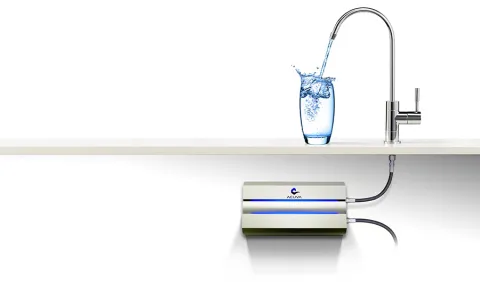UBC innovation set to bring clean drinking water to millions

Circumstances sometimes bring the right people together to produce something very special. When Manoj Singh, president and CEO of Acuva Technologies, left the UBC-founded company Westport Innovations in 2014, he set off a chain of events that led to a water purification solution that is poised to have a major impact on the world. Looking for a new business opportunity and familiar with UBC’s resources for startups, Singh approached the University-Industry Liaison Office (UILO), which introduced him to a number of UBC inventions available for commercialization.
Singh was particularly struck by an invention disclosure submitted by chemical and biological engineering professor Fariborz Taghipour, describing a drinking water purification method that used ultraviolet (UV) radiation generated by light-emitting diodes (LEDs). UV-based radiation has been the gold standard for water purification for many years, as it generates short-wavelength (UV-C) radiation that effectively inactivates harmful pathogens by disrupting their DNA and rendering them unable to infect or reproduce. These legacy systems, however, use mercury-based UV lamps, which have high energy requirements, last between six months to a year, run hot, foul easily and are an environmental hazard.
Dr. Taghipour, an expert in photoreaction engineering, has worked in water treatment with UV reactors for many years. His “aha” moment was brought about by a desire to make a positive impact on society. “Every year several million people die as a result of water-related diseases, making them the leading cause of disease and death around the world,” Taghipour states. “When UV-C LEDs became available, my research group saw the potential and built an efficient UV photo-reactor operating with LEDs that worked brilliantly.” This ingenious solution solved many of the issues associated with legacy UV lamp-based systems. LEDs have low power requirements, run cool, are long-lasting and maintenance-free, and do not have a negative environmental impact.
When Singh and Taghipour met through the UILO, they quickly realized their shared interests and that their respective business and research expertise were complementary — enough so, that they decided to start a company together.
They developed a product strategy that initially leveraged the LED-UV reactor’s low-power requirements for mobile, off-grid applications ideal for developing countries, where the need for safe water is the most evident. Their focused approach created a standalone, low-power, portable water purifier for off-the-grid use, that would also work well in recreational boats, vehicles and cabins. This business model was attractive to investors, whose support enabled them to grow their team to move their product forward.
In the summer of 2016, Acuva became one of the first startups to move into the newly minted HATCH incubator in UBC’s Institute for Computing, Information, and Cognitive Systems (ICICS). HATCH is a collaboration between ICICS and entrepreneurship@UBC (e@UBC), and provides office, project and maker space to UBC ventures with a hardware component, as well as mentorship from seasoned entrepreneurs-in-residence.
Acuva flourished in HATCH — with management, production, and research and development teams — and investment followed. “One of the things that distinguishes Acuva,” Taghipour states, “is that we are close to high-ranking research groups at UBC, so innovation can go both ways.” As Acuva's portable units penetrated their target markets, innovation continued in both Taghipour’s lab and Acuva’s research and developemnt wing, staffed by UBC Applied Science doctoral alumni. Driven by improvements in LED technology and the team’s patented innovations in optics, hydrodynamics, thermal management and more, Acuva was able to modularize their technology so that it could be used in water coolers/dispensers, refrigerators and even coffee machines.
This development has dramatically expanded Acuva’s potential, and brought the founding duo’s ideal of providing clean drinking water to millions within view. “Fariborz’ expertise allowed us to ‘leapfrog’ to the modular unit, rather than pivot,” Manoj enthuses. Acuva gained global attention, and several OEM and major customer partnerships followed. In one instance, the Acuva module replaced a UV lamp-based system containing mercury in a type of drinking water fountain widely used in schools and offices. In addition, the legacy system was placed before the tank, because the bulbs heated the water, creating a potential risk for growth of pathogens that could affect the unsuspecting drinker. The UV lamp also consumed a lot of power and required frequent replacement, which sometimes meant there would be no drinking water until the fountain could be serviced. The Acuva system, which is integrated after the tank, effectively acts as the last line of defense against harmful microorganisms. It also provides an ultra-low maintenance solution. Acuva’s innovative module design is heat-regulated and built with stainless steel to prevent deposits, and lasts many times longer than the short six months to one year lifespan of mercury-based UV lamps. Meanwhile, millions of schoolchildren and office workers will enjoy uninterrupted access to clean drinking water, all while potentially eliminating the use of up to 1.2 million plastic bottles over each unit’s lifetime.
Talent, drive and an unflinching resolve to effect positive change in both founding partners have produced a research and innovation alchemy within Acuva that is set to change the world. But like all successful startups, Acuva could have derailed at any time. “You are so vulnerable at the beginning,” Singh cautions. “You need to do everything right to be successful, and just one or two things wrong to fail.”